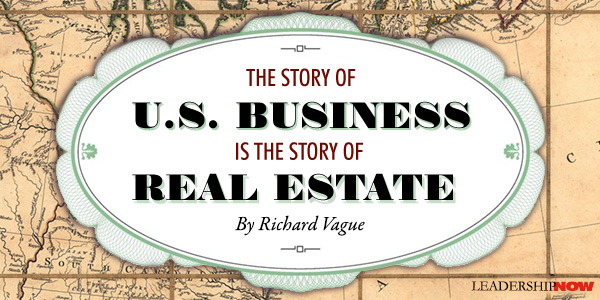 |
 |
08.20.21

The Story of U.S. Business Is the Story of Real Estate
THE STORY of American business is the story of real estate — a story of more than 200 years of claiming, seizing, developing, settling, and speculating in vast areas of land. Even though business histories often give more attention to the history of the manufacturing industry, real estate has been the more dominant factor. Wealthy colonials organized massive land companies well before the American Revolution. Land had been the source of power and wealth in the Old World, and so for Europeans, the vast acreage of the New World held great promise, whether for farming, housing, or other ends. The early colonial years included land charters and grants, such as those to William Penn and George Calvert, but these often went to absentee landlords. From the outset, ambitious American colonists well understood that buying land and waiting for the population to increase was a path to riches. Dating the beginning of true American business correlates not to the first mills or manufactories but to the Ohio Company of Virginia, which was formed in 1748 to acquire hundreds of thousands of acres of land. Many of its shareholders and administrators — Virginia’s elite, including George Washington — were born on American soil. The American Revolution itself was in large part about land, as land speculators including Washington and Patrick Henry bristled under edicts imposed on colonists in 1763 and 1773 that restricted their ability to buy and settle on lands west of the Appalachians. Rights to the land instead were reserved for others, such as the wealthy in England. Since then, the history of American business has had as one of its key elements an unbroken march of real estate speculators and developers, from Robert Morris and William Bingham to John Jacob Astor, Fred French, Eli Broad, Trammell Crow, and many more. At $60 trillion in 2019, real estate was the single highest-value asset in the United States, greater than the value of stocks, bonds, or any other major asset category. Yet extensive as it is, real estate is a hidden giant. It’s always had much broader ownership than most other large-scale businesses, with a higher number of smaller concerns, and doesn’t lend itself as readily to conventional corporate and public equity structures. So, although massive, real estate hasn’t shown up as prominently on the lists of the largest businesses, industries, and wealthiest individuals that shape our economic imagination. With America’s Industrial Revolution in the 1800s, infant mortality fell, life spans increased, and the country saw an unprecedented explosion in population growth — and the real estate business does very well when the population grows rapidly. More people meant more buyers. Owning and improving land necessitated getting to that land, and so a booming real estate enterprise led to America’s transportation industry. This history threads through the centuries, from the earliest toll road and canal companies to the almost century-long, tumultuous domination of the railroad industry to the 20th-century network of roads and highways to serve the automobile revolution. The mammoth steel, coal, and petroleum industries that tower over U.S. business history can be interpreted as suppliers to the transportation industry. Alongside this came the financiers that supplied the funds to make it all possible. Real estate was the base of the economy. The country spent billions to build canals, railroads, and highways, but the money spent to buy and develop the surrounding real estate — the homes, offices, retail, and farms in the land surrounding these new transportation arteries — exceeded even that amount. The future of America’s real estate industry will follow a similar course: 1. Real estate developers will capitalize on infrastructure investment. The paradigm played out through the history of real estate speculation attaching itself to expansions in transportation applies to today’s infrastructure legislation. As infrastructure is built, modernized, and expanded, the spaces contingent on the public infrastructure investment will yield private wealth through real estate. 2. Commercial real estate will profit even as it transforms. The COVID pandemic has brought talk of office buildings — and even the cities that aggregate them — going obsolete. Others have predicted that, with the explosion of intangible, virtual “space,” the tangible space of land and commercial real estate will lose importance. But even with this, real estate continues to be a dominant factor. Virtual commerce still relies on actual land. Companies such as Amazon and Google gobble up acres of land for their warehouses and server farms, and the growing roster of such futuristic businesses as genetic engineering firms seize new buildings with specialized labs designed for their work. No matter what the future may bring, real estate will remain a dominant part of the story of business in the U.S.  
Posted by Michael McKinney at 07:31 AM
|
BUILD YOUR KNOWLEDGE
 

How to Do Your Start-Up Right STRAIGHT TALK FOR START-UPS 
Grow Your Leadership Skills NEW AND UPCOMING LEADERSHIP BOOKS 
Leadership Minute BITE-SIZE CONCEPTS YOU CAN CHEW ON 
Classic Leadership Books BOOKS TO READ BEFORE YOU LEAD |